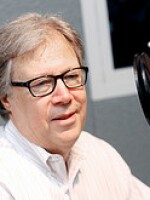A lot of us who think about serious music and its prospects have been especially fretting about the future of the live concert.
In the past couple of weeks, I’ve been to a half-dozen live musical performances.
Among them:
I heard the Sybarite5 string quintet play at the hip new Brooklyn arts space called National Sawdust.
I took in the Hartt School’s annual “collage” concert, which features a series of rapid-fire short performances by the various departments and ensembles of the school, given at UH’s Lincoln Theater.
I heard the celebrated contemporary music sextet Bang on a Can All-Stars, also at Lincoln.
I wasn’t able to get to it, but I also noted with interest (and heard several detailed descriptions of) the enterprising love-themed program –featuring dancers, puppets and a live visual artist -- that the Hartford Symphony presented at the Bushnell’s Belding Theater last weekend.
A lot of us who think about serious music and its prospects have been especially fretting about the future of the live concert.
Mainly we’ve been thinking that concerts in general need to be less predictable, less bound to the traditions and orthodoxies and rituals that have defined them for almost two centuries.
My recent spate of concentrated concert-going tells me that this is becoming more than theorizing: it’s happening.
But what is “it,” exactly?
For one thing, all three of these concerts were around an hour, or a maybe a bit more, in duration. All three were presented without intermission. All featured informal talking from the stage.
But the main thing was the music itself. These concerts juxtaposed styles and genres in a freewheeling way that simply would not have been possible a generation ago.
A few specifics:
The Sybarite5 concert featured the premiere of a new suite of short pieces commissioned by the group from living composers. The six short pieces roughly corresponded to the sections of the Baroque Suite. The segments could hardly have been more different from one another, and yet this didn’t seem to be a problem for either the players or the audience. The stylistic variation was simply a reflection of the fact that these days young composers can pretty much write what they want. And if it’s convincing and original, people will embrace it. For the record, the Sybs also played a few of their patented transcriptions of Radiohead tunes, a category that no longer raises an eyebrow, even among older concertgoers whose relationship to the originals might be a tad tenuous.
Hartt’s collage concert is deliberately designed to be a mash-up kind of event, so it wasn’t so surprising that it gave us an Elvis ballad on top of a Tchaikovsky ballet excerpt on top of a Charlie Parker tune on top of a concerto for sax quartet on top of the duet from Bizet’s “The Pearl Fishers” on top of the thundering opening moments from Orff’s “Carmina Burana.” Et cetera. The notable thing about this yearly collage evening: people – and by people we mean a healthy proportion of veteran concertgoers – eat it up.

Concerts need to be less predictable, less bound to the traditions, orthodoxies, and rituals that have defined them for almost two centuries.
About the Bang on a Can concert I will just say this: I don’t think it would be possible to think of two pieces of music more different than the two that concluded the program: the late Steve Martland’s fierce, heavy-metal-inspired “Horses of Instruction”, and Phil Glass’s twinkling, triadic, lullaby-like “Closing,” which is the final section of his seminal 1982 “Glassworks.” The juxtaposition was thrilling, and oddly, smile-inducing. I found myself thinking of the old jazz maxim: Everything is everything.
When we talk about new concert models, though, we have to confront two questions:
1. Does all of this mean that traditional, orthodox concerts are suddenly passé and therefore in danger of disappearing altogether?
2. Are we dumbing down classical music in an attempt to attract and appease a restless, musically inexperienced audience?
My answers: (1) No, and (2) Possibly.
I don’t see any reason to think that traditional concerts – traditional length, traditional repertoire, traditional traditions – should feel threatened by the fact that new models are also taking shape. Nobody wants to see the Brahms Requiem programmed alongside a Led Zeppelin medley, or for that matter, alongside anything. The orchestral pillars, including concertos, are not going to be shouldered aside by, as Keith Lockhart once put it to me, “bad arrangements of Moon River.”
But maybe, as the recent HSO program seemed to demonstrate, the look and feel of some concerts will reflect a broader swath of possibilities. Taste and imagination and creativity will have to continue to be the hallmarks, even in our emerging, anything-goes era.
As for dumbing down, well, that’s more complicated. I myself think it’s pointless to deny that attention spans have gotten shorter, that the audience’s capacity – or willingness -- to process complex, difficult music is not what it once was. I certainly have no problem with shorter concerts. Or concerts in which perhaps there is one big work rather than several.

And we have to be careful about what or whom we call dumb. I regard the quintet from “West Side Story” as a more musically sophisticated piece of work than the sextet from “Lucia” But at least for concert-planning purposes, one is glibly and condescendingly called “popular” music while the other is called “art.”
My two-week takeaway: The future of concerts, along with the future of music, is going to be increasingly concerned with boundaries – defining them more astutely, and sometimes, when the occasion seems right, eradicating them more completely.
Reach Steve Metcalf at spmetcalf55@gmail.com.





